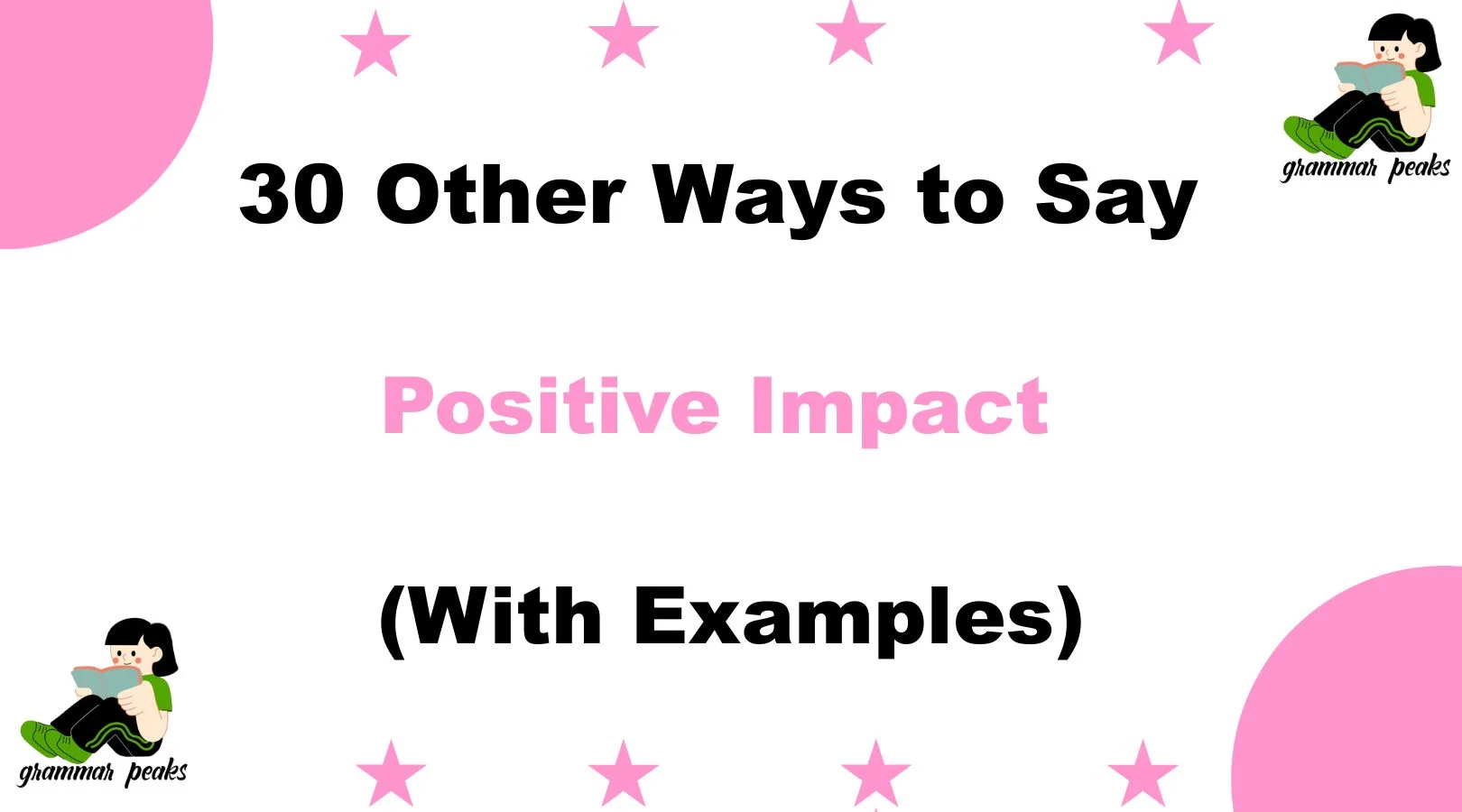Finding the right words to express genuine care and contribution can make your communication feel more personal, thoughtful, and warm. Whether you’re writing an email, drafting a proposal, or giving someone credit in a meeting, saying someone had a “positive impact“ is powerful—but it’s also widely used. Using a fresh phrase can elevate your message and make it stand out with sincerity.
This guide offers 30 professional alternatives to help you say “positive impact” in ways that feel authentic, polished, and empathetic. Each option includes definitions, practical examples, and tone tips so you can speak with both clarity and heart.
What Does “Positive Impact” Mean?
Positive impact refers to any action, contribution, or presence that creates a constructive, meaningful, or beneficial outcome—especially in a professional or interpersonal context. It’s the ripple effect someone has when they improve results, elevate team morale, solve problems, or spark innovation. This could be through direct achievements like increasing sales, or through indirect influence like encouraging collaboration or offering emotional support.
What makes an impact “positive” isn’t just about doing something—it’s about making things better, smoother, or more valuable for others. Whether you’re highlighting someone’s influence in a reference, feedback, or thank-you note, acknowledging a positive impact shows you’ve noticed the difference they made—and that their contribution truly mattered.
When to Use “Positive Impact”
- In performance reviews to highlight meaningful employee contributions
- In recommendation letters to showcase someone’s value or influence
- In client testimonials to express the results of a service or collaboration
- In leadership speeches or reports to reflect team progress or cultural growth
Is It Professional/Polite to Say “Positive Impact”?
Yes, saying “positive impact” is both professional and polite, especially in formal settings like workplace communication, evaluations, or client interactions. It’s a respectful and appreciative way to acknowledge someone’s contribution without overstatement. However, because it’s commonly used, it can sometimes feel vague or impersonal if not paired with specific examples.
To make your message more powerful and memorable, it’s often better to use a more tailored alternative that captures the exact nature of the person’s influence. Still, as a general phrase, it remains a safe, courteous, and effective option in most professional contexts.
Pros or Cons for saying “Positive Impact”
Pros:
- Universally understood
- Professional and respectful
- Works in many industries
Cons:
- Can sound generic or cliché
- May not fully capture the depth or nuance of a person’s contribution
- Lacks emotional color or specificity
Synonyms for “Positive Impact”
- Meaningful Contribution
- Lasting Influence
- Valuable Addition
- Transformative Effect
- Driving Force
- Constructive Role
- Empowering Presence
- Purposeful Support
- Inspiring Contribution
- Tangible Difference
- Elevated Outcome
- Strategic Input
- Meaningful Engagement
- Uplifting Influence
- Substantial Help
- Encouraging Force
- Supportive Impact
- Positive Presence
- Clear Contribution
- Noteworthy Change
- Credible Input
- Beneficial Outcome
- Strengthened Effort
- Meaningful Support
- Forward Momentum
- Reliable Contribution
- Game-Changing Effect
- Authentic Engagement
- Motivating Presence
- Progressive Impact
1. Meaningful Contribution
Definition: A thoughtful or valuable addition that creates genuine progress.
Detailed Explanation: This phrase emphasizes the substance and sincerity behind someone’s involvement. It implies they weren’t just present—they actively added value.
Scenario Example: Her thoughtful feedback during the review process was a meaningful contribution that shaped the final product.
Best Use: In project wrap-ups, peer recognition, or leadership reviews.
Worst Use: For small, routine tasks where the contribution isn’t unique.
Tone: Warm, appreciative, and professional
2. Lasting Influence
Definition: A contribution that continues to make a difference over time.
Detailed Explanation: Use this when someone’s efforts have created enduring results, whether through guidance, innovation, or mentorship.
Scenario Example: His mentorship left a lasting influence on how the team handles challenges today.
Best Use: Describing leadership, training, or legacy contributions.
Worst Use: For short-term roles or minor tasks.
Tone: Reflective, respectful, and sincere
3. Valuable Addition
Definition: A person or effort that brings recognized worth to a situation, project, or team.
Detailed Explanation: This phrase is ideal when someone’s involvement enhanced results, improved collaboration, or strengthened the process in a visible way.
Scenario Example: Her attention to detail was a valuable addition to the product design phase.
Best Use: Performance reviews, recommendation letters, or welcoming someone new to a team.
Worst Use: In situations where the value added is unclear or minimal.
Tone: Professional, affirming, and respectful
4. Transformative Effect
Definition: A contribution that significantly changes or elevates a situation or outcome.
Detailed Explanation: Use this to acknowledge when someone’s input brought about a major shift in process, results, or culture.
Scenario Example: His leadership brought a transformative effect to how we approach remote collaboration.
Best Use: Recognizing innovation, leadership, or cultural change.
Worst Use: Routine work or low-stakes situations.
Tone: Impactful, bold, and appreciative
5. Driving Force
Definition: The main reason or motivation behind progress or success.
Detailed Explanation: This alternative credits someone as the key player or motivator who propelled a project, decision, or initiative forward.
Scenario Example: She was the driving force behind the successful launch of our new platform.
Best Use: Acknowledging ownership, leadership, or initiative.
Worst Use: When several people contributed equally and naming one would overlook others.
Tone: Strong, motivating, and empowering
6. Constructive Role
Definition: A role that contributes to building or improving something meaningful.
Detailed Explanation: Use this when someone helps shape progress through productive ideas, teamwork, or solutions.
Scenario Example: His constructive role in the negotiation helped both sides reach a fair agreement.
Best Use: Group projects, partnerships, or conflict resolution.
Worst Use: When someone played a passive or neutral role.
Tone: Balanced, collaborative, and positive
7. Empowering Presence
Definition: Someone who lifts others up or creates an environment where others can succeed.
Detailed Explanation: This phrase highlights emotional intelligence, supportiveness, and encouragement, especially in leadership or mentorship settings.
Scenario Example: Her empowering presence helped new hires feel confident and welcomed from day one.
Best Use: Leadership feedback, onboarding support, or emotional encouragement.
Worst Use: When discussing purely technical contributions.
Tone: Warm, motivational, and uplifting
8. Purposeful Support
Definition: Help or involvement given with intention and impact.
Detailed Explanation: Use this phrase when support wasn’t just helpful but thoughtfully aligned with goals or outcomes.
Scenario Example: His purposeful support ensured that the client transition was smooth and thorough.
Best Use: Customer service, training, or transitional roles.
Worst Use: Vague or one-time support with no measurable impact.
Tone: Intentional, thoughtful, and respectful
9. Inspiring Contribution
Definition: A contribution that motivates or encourages others through its excellence or heart.
Detailed Explanation: This phrase is ideal for recognizing people who sparked enthusiasm, creativity, or teamwork through their efforts.
Scenario Example: Her inspiring contribution motivated the whole team to push for higher standards.
Best Use: Creative roles, leadership, volunteer work, or team-building.
Worst Use: In highly technical or emotion-neutral settings.
Tone: Emotional, heartfelt, and appreciative
10. Tangible Difference
Definition: A clear and measurable improvement made by someone’s actions.
Detailed Explanation: This alternative emphasizes visible, data-driven, or experiential results.
Scenario Example: His process changes made a tangible difference in reducing service wait times.
Best Use: Results-oriented settings like operations, performance, or KPIs.
Worst Use: When outcomes are still in progress or subjective.
Tone: Factual, confident, and affirming
11. Elevated Outcome
Definition: A result that is improved or taken to a higher level because of someone’s input.
Detailed Explanation: This phrase acknowledges how someone’s work boosted the final result, showing they helped raise the standard or expectations.
Scenario Example: Her insight into the customer journey led to an elevated outcome in user satisfaction.
Best Use: End-of-project reviews or client presentations.
Worst Use: In cases where improvement wasn’t clearly demonstrated.
Tone: Positive, polished, and results-oriented
12. Strategic Input
Definition: Thoughtful contributions that influence key decisions or direction.
Detailed Explanation: Use this when someone provided advice, data, or vision that helped guide a project or decision wisely.
Scenario Example: His strategic input helped us prioritize the features that mattered most to users.
Best Use: Planning meetings, consulting, or advisory roles.
Worst Use: For simple tasks or day-to-day execution.
Tone: Analytical, respectful, and professional
13. Meaningful Engagement
Definition: Active involvement that adds genuine value to a discussion or project.
Detailed Explanation: This phrase is perfect for recognizing someone who participated with intention, care, and presence.
Scenario Example: Her meaningful engagement during the stakeholder meeting helped bridge gaps in understanding.
Best Use: Meetings, planning sessions, or collaborative settings.
Worst Use: Passive or minimal participation.
Tone: Intentional, respectful, and collaborative
14. Uplifting Influence
Definition: The ability to raise morale or encourage others through attitude or action.
Detailed Explanation: Use this when someone’s attitude or behavior positively affected the team’s mood, motivation, or performance.
Scenario Example: His uplifting influence kept the team energized during tough deadlines.
Best Use: Morale-boosting, leadership, or emotional support recognition.
Worst Use: In analytical or number-focused settings.
Tone: Warm, supportive, and heartfelt
15. Substantial Help
Definition: Significant and measurable support that contributes to success.
Detailed Explanation: This phrase indicates the help provided was not minor—it was critical to getting things done well.
Scenario Example: Her substantial help in organizing the event ensured everything ran smoothly.
Best Use: Event planning, execution roles, or project assistance.
Worst Use: Small favors or superficial support.
Tone: Strong, appreciative, and clear
16. Encouraging Force
Definition: A person who consistently motivates others toward progress.
Detailed Explanation: This alternative is used for someone who brings energy, reassurance, or motivation, helping others keep moving forward.
Scenario Example: He was an encouraging force throughout the campaign, reminding everyone what we were working toward.
Best Use: Motivational leadership, coaching, or morale-building.
Worst Use: Technical contributions without emotional influence.
Tone: Energetic, caring, and empowering
17. Supportive Impact
Definition: Help or input that strengthens others’ efforts.
Detailed Explanation: This phrase combines the emotional and practical value of someone’s contribution in a way that uplifts the team.
Scenario Example: Her supportive impact helped the interns feel more confident and capable in their new roles.
Best Use: Mentoring, team environments, or onboarding.
Worst Use: When support was absent or inconsistent.
Tone: Kind, constructive, and warm
18. Positive Presence
Definition: Someone who brings calm, optimism, or encouragement to a space.
Detailed Explanation: This term focuses on who the person is, not just what they do, and how their demeanor helps others thrive.
Scenario Example: His positive presence helped ease the tension during high-stakes meetings.
Best Use: Conflict resolution, leadership, or culture-building.
Worst Use: When discussing metrics or outcomes only.
Tone: Gentle, emotional, and uplifting
19. Clear Contribution
Definition: A contribution that is visible, effective, and easy to recognize.
Detailed Explanation: Use this when you want to emphasize the unmistakable and direct value someone provided.
Scenario Example: Her clear contribution to the research helped finalize the client proposal on time.
Best Use: Presentations, credit-giving, or reports.
Worst Use: For group efforts where individual impact is unclear.
Tone: Direct, respectful, and affirmative
20. Noteworthy Change
Definition: A significant shift or improvement worth acknowledging.
Detailed Explanation: Use this phrase when someone’s involvement created visible, important shifts, whether in mindset, performance, or process.
Scenario Example: His ideas led to a noteworthy change in how we approach internal communication.
Best Use: Feedback sessions, retrospectives, or impact reviews.
Worst Use: Situations with subtle or gradual change.
Tone: Professional, observant, and respectful
21. Credible Input
Definition: Reliable and respected ideas or suggestions that improve decisions.
Detailed Explanation: This phrase values thought leadership and trustworthiness, especially when someone’s ideas carried weight.
Scenario Example: Her credible input helped the board reach a confident decision.
Best Use: Leadership, decision-making, or advisory settings.
Worst Use: Casual or unverified suggestions.
Tone: Confident, expert, and professional
22. Beneficial Outcome
Definition: A result that is clearly helpful or advantageous.
Detailed Explanation: Use this when someone’s actions led to good results, especially for the team, organization, or community.
Scenario Example: His initiative led to a beneficial outcome for both departments.
Best Use: Project summaries or performance reviews.
Worst Use: When the benefit is minimal or questionable.
Tone: Positive, balanced, and respectful
23. Strengthened Effort
Definition: A contribution that boosted or reinforced a team or project.
Detailed Explanation: This shows how someone added to or fortified what others were already doing.
Scenario Example: Her input strengthened our effort to streamline the client onboarding process.
Best Use: Teamwork, collaboration, or combined projects.
Worst Use: Solo contributions or unrelated work.
Tone: Supportive, energizing, and collaborative
24. Meaningful Support
Definition: Help that’s thoughtful, needed, and impactful.
Detailed Explanation: More than just lending a hand, this phrase acknowledges personal care, intention, and timing in the help given.
Scenario Example: His meaningful support during my transition made all the difference.
Best Use: Transitions, onboarding, or personal acknowledgments.
Worst Use: Support that was casual or impersonal.
Tone: Caring, thoughtful, and warm
25. Forward Momentum
Definition: A contribution that keeps things moving in the right direction.
Detailed Explanation: This phrase is for someone whose energy, decision, or presence helped maintain progress or urgency.
Scenario Example: She gave the project the forward momentum it needed after a slow start.
Best Use: Time-sensitive projects, innovation, or growth discussions.
Worst Use: Stalled or delayed efforts.
Tone: Energetic, action-focused, and strategic
26. Reliable Contribution
Definition: A consistent and trustworthy addition to a team or effort.
Detailed Explanation: This highlights dependability and steady value, ideal for recognizing quiet, consistent performers.
Scenario Example: His reliable contribution helped the team meet every single milestone.
Best Use: Long-term projects, employee reviews, or team leadership.
Worst Use: When the input was one-time or unpredictable.
Tone: Steady, respectful, and grounded
27. Game-Changing Effect
Definition: A contribution that shifts the direction, strategy, or outcome dramatically.
Detailed Explanation: Use this when someone made a bold, innovative, or crucial move that changed everything.
Scenario Example: Her redesign had a game-changing effect on user engagement.
Best Use: Innovation, product design, or strategy.
Worst Use: Incremental improvements.
Tone: Bold, dramatic, and visionary
28. Authentic Engagement
Definition: Real, sincere involvement that builds trust and connection.
Detailed Explanation: Use this for people who engage genuinely with intention and care, often boosting relationships or morale.
Scenario Example: His authentic engagement with clients earned lasting partnerships.
Best Use: Relationship-building, mentoring, or customer success.
Worst Use: When engagement is performative or required.
Tone: Genuine, respectful, and heartfelt
29. Motivating Presence
Definition: A person whose presence energizes and inspires those around them.
Detailed Explanation: This person doesn’t need to speak up constantly—their presence alone improves performance or spirit.
Scenario Example: Her motivating presence kept the team focused during the busiest week of the quarter.
Best Use: High-pressure situations or recognition speeches.
Worst Use: Silent or absent participation.
Tone: Positive, energizing, and personal
30. Progressive Impact
Definition: A steadily growing and evolving contribution toward positive change.
Detailed Explanation: Use this when someone’s ongoing work continuously makes things better, rather than just one big win.
Scenario Example: Over time, his progressive impact reshaped how we handle customer feedback.
Best Use: Continuous improvement roles, leadership development, or evolution-focused settings.
Worst Use: Single-event situations.
Tone: Forward-thinking, respectful, and dynamic
Conclusion
Finding the right words to express a positive impact can transform how your message is received—whether you’re offering praise, writing a reference, or delivering feedback. Using more thoughtful, warm, and professional language helps your communication feel genuine and memorable. These 30 alternatives allow you to go beyond cliches and offer words that truly resonate with the moment and the person. From “meaningful support” to “game-changing effect,” each phrase carries its own tone and strength—giving you flexibility based on your relationship, setting, and purpose.
The goal isn’t just to sound polished—it’s to make others feel seen, valued, and respected. Whether you’re in HR, leadership, or everyday correspondence, these phrases let you communicate care and clarity without sounding repetitive. Thoughtful language fosters connection—and in professional environments, that’s a superpower.
FAQs
1. What does “positive impact” mean in a professional setting?
Positive impact refers to any action, behavior, or contribution that helps move a team, project, or person forward in a beneficial, supportive, or meaningful way. It often relates to results, morale, innovation, or teamwork.
2. Is it professional to say someone made a “positive impact”?
Yes, but it’s often too general. In professional communication, it’s better to use specific and descriptive alternatives like “elevated outcome” or “strategic input” that better reflect the nature of the person’s contribution.
3. When should I use more specific alternatives to “positive impact”?
Use them when you want your message to feel more personal, memorable, or accurate—like in performance reviews, recommendation letters, client emails, or team acknowledgments.
4. How do I know which phrase fits best?
Match the phrase to the type of impact made. If someone energized the team, choose “uplifting influence”. If they guided a major decision, “strategic input” may be more fitting. Consider tone, formality, and intent.
5. Are these phrases suitable for resumes or LinkedIn?
Absolutely. Using terms like “progressive impact” or “meaningful engagement” can make your resume or profile stand out by sounding more human, thoughtful, and results-focused—while still remaining professional.

Mia Rose is a passionate Language Coach and Contributor at GrammarPeaks, where she specializes in practical grammar tips and language learning strategies. With a strong foundation in education and communication, Mia brings a friendly, approachable style to her writing. Her goal is to make complex grammar rules simple and usable for learners at any level, helping them grow in both confidence and fluency.





